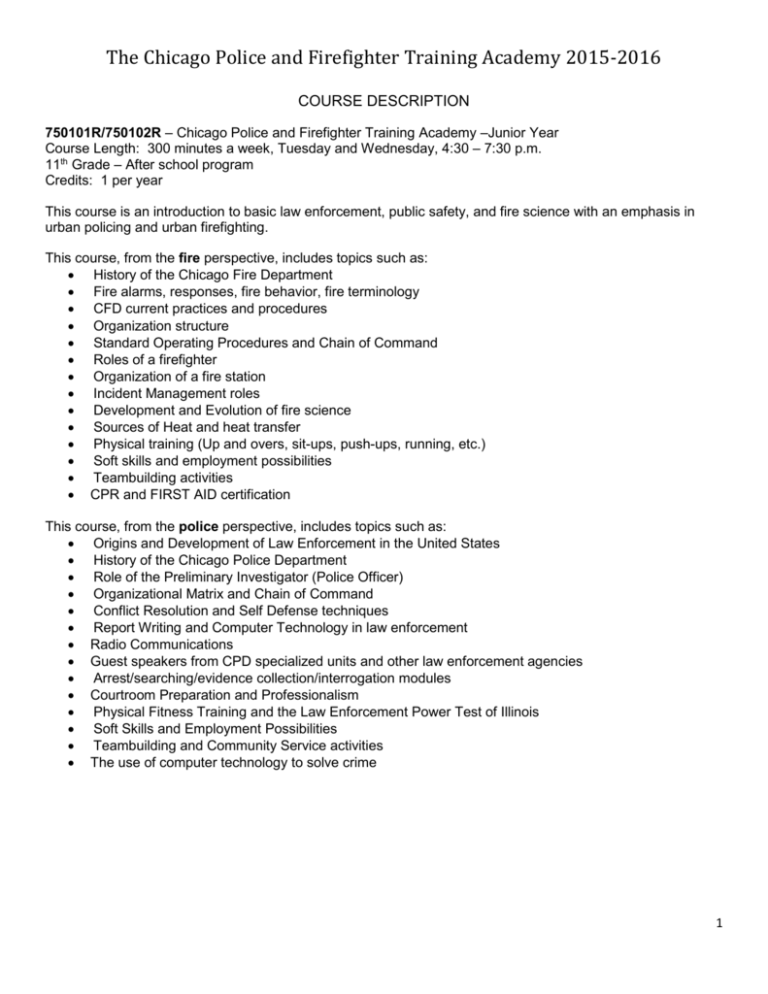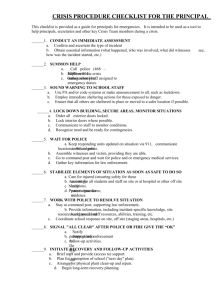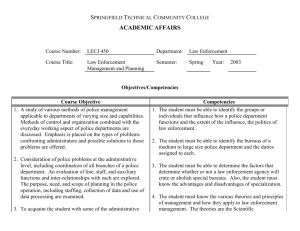Schedulers Fact Sheet -COURSE DESCRIPTION
advertisement

The Chicago Police and Firefighter Training Academy 2015-2016 COURSE DESCRIPTION 750101R/750102R – Chicago Police and Firefighter Training Academy –Junior Year Course Length: 300 minutes a week, Tuesday and Wednesday, 4:30 – 7:30 p.m. 11th Grade – After school program Credits: 1 per year This course is an introduction to basic law enforcement, public safety, and fire science with an emphasis in urban policing and urban firefighting. This course, from the fire perspective, includes topics such as: History of the Chicago Fire Department Fire alarms, responses, fire behavior, fire terminology CFD current practices and procedures Organization structure Standard Operating Procedures and Chain of Command Roles of a firefighter Organization of a fire station Incident Management roles Development and Evolution of fire science Sources of Heat and heat transfer Physical training (Up and overs, sit-ups, push-ups, running, etc.) Soft skills and employment possibilities Teambuilding activities CPR and FIRST AID certification This course, from the police perspective, includes topics such as: Origins and Development of Law Enforcement in the United States History of the Chicago Police Department Role of the Preliminary Investigator (Police Officer) Organizational Matrix and Chain of Command Conflict Resolution and Self Defense techniques Report Writing and Computer Technology in law enforcement Radio Communications Guest speakers from CPD specialized units and other law enforcement agencies Arrest/searching/evidence collection/interrogation modules Courtroom Preparation and Professionalism Physical Fitness Training and the Law Enforcement Power Test of Illinois Soft Skills and Employment Possibilities Teambuilding and Community Service activities The use of computer technology to solve crime 1 The Chicago Police and Firefighter Training Academy 2015-2016 750201R/750202R – Chicago Police and Firefighter Training Academy –Senior Year Course Length: 300 minutes a week, Tuesday and Wednesday, 4:30 – 7:30 p.m. Students taking the EMT-B class will meet: Monday, Tuesday, and Wednesday from 4:30-7:30 p.m. 12th Grade – After school program Credits: 1 per year This course is an advanced training level course designed to expand upon the student’s knowledge and skills previously introduced in CPFTA-I. This course will include fire topics such as infectious control, high-rise firefighting, arson investigations, flashovers, back draft fires, fire tetrahedron, and effects of fire on various structures, and final physical training test. A selected group of students will also learn about pre-hospital emergency medical care, ambulance service, and all the aspects of Emergency Medical Technician – Basic. Field trips, teambuilding activities are included in this year. Students will receive their AED Defibrillator and First Responder training and certification. The police emphasis will include topics such as methods of criminal investigation, national crime rate statistics, criminal law terms, examining policing in multicultural communities, learning the standards required for police recruitment and retention, responsibilities of specialized units in law enforcement, becoming knowledgeable about police discretion and behavior, learning about advancements in technologies in solving crimes (DNA), crime scene investigations, search and seizure procedures, vehicle searches, physical fitness training, role playing in different scenarios, guest speakers from CPD and other law enforcement agencies on their responsibilities and legal jurisdictions and equipment used by police officers. Students may also be eligible to sit and take the 20-hour Unarmed Security Guard Class through Monterrey Security Services and apply to receive their PERC credentials. Educational law enforcement related field trips, teambuilding activities and community service projects are included in this year. All senior cadets must also take and pass the Occupational Safety and Health Administration (OSHA) 10-hour online course and the Cyber Safety Awareness Training Course. These courses are required to graduate from the program. About OSHA: Every five days, one teen is killed on the job. According to the National Institute of Occupational Safety, there are about 70 work related fatalities per year among this youth population. More than 200,000 young workers are injured on the job, and 70,000 of them require emergency room or hospital treatment. Further, youth workers continue to have the highest rates of work-related deaths, injuries and illnesses easily double and in some cases triple that for any other age category. The goal of the CareerSafe program is to teach younger workers how to stay safe in the workplace and begin to prepare these young men and women for a safe and prosperous future in their chosen career. By providing entry-level workers, particularly high school and college students, with fundamental safety knowledge needed in the workplace, this program brings the significance of safety to the forefront. Additionally, it seeks to challenge society to affirm the value of life by joining efforts to reduce the workplace injuries and fatalities suffered by this at risk working population. This makes our cadets more marketable and employable. If cadets fail the General Industry on line class, it will be their responsibility to pay for the second class. About CareerSafe Cyber Safety Awareness Training Course: Cyber Safety was developed in response to an ever-growing cyberspace presence of youth and young adults. Cyberspace and technology have made it easier than ever to stay connected and share information. Youth and young adults lead the way in adopting new technologies into their lisfestyles which makes them especially at risk of exposure to new vulnerabilities and dangers. On line course includes: CYBER SAFETY – Explore techniques to protect personal, private information in cyberspace and avoid malicious online threats. 2 The Chicago Police and Firefighter Training Academy 2015-2016 CYBERBULLYING – Generate awareness about cyber bullying and how to recognize and respond to a bullying situation. SEXTING – Learn about sexting and the consequences and danger that can arise from engaging in the action. NOTE: CPFTA credit can be used toward a student’s Career Education requirement or as and elective to graduate. To access student attendance and grades please: 1. Go to www.ccdata.cps.edu 2. Login using your CPS user name and password 3. On the menu bar on the right top corner, click on “TOOLS” 4. Click on “GRADES and ATTENDANCE” 5. Click on ‘CPFTA’ (If you do not see the link “cpfta grades” on your menu, please email Sandra Irizarry at sacastillo@cps.edu with your contact information to have your name added. 6. You should now see “CPFTA Grades” or “CPFTA Attendance”. Click on what you would like to see. Grade sheets are given to all cadets every 10 weeks. A grade is entered every 5 weeks and attendance is recorded at the end of every week. You can view attendance daily. Grades will be available on the dates listed below. If you have any questions, please contact Mrs. Irizarry, CPFTA Program Coordinator at 773-553-2485, sacastillo@cps.edu , CPFTA@cps.edu , or visit our website at www.cpfta.com. CPFTA GRADES AVAILABLE TO SCHOOLS: 5- week : None available as program starts September 22, 2015 10-week: November 4, 2015 15-week: December 16, 2015 20-week: January 27, 2016 25-week: March 2, 2016 30-week: March 30, 2016 35-week: May 11, 2016 40-week: June 8, 2016 3









